- Home
- Shirlee McCoy
Hidden Witness Page 2
Hidden Witness Read online
Page 2
“I want to see if we’re being followed.”
“I’d rather keep moving. Together,” she replied, her hand still on his arm.
“I’m not going to abandon you here, Anna. I’ll be back for you.”
“I’m not worried about me. I’m worried about you. There are men with guns out there,” she hissed.
“I’m armed.” He tried to reassure her, but she shook her head.
“You’re one against many. Those aren’t good odds.”
“Stay here,” he repeated. He didn’t have time to argue with her or to explain that he had spent years in the military working special ops.
He eased around the boulder, staying close to its granite face. Moonlight glittered on mineral-rich earth and painted the treetops white-gold. It was a beautiful night. The kind that had drawn him back to Texas and to the ranch after he had been medically discharged from the Navy. He had longed for the slow-pace of small town life, the busyness of the cattle business, the feel of being home. He’d had no idea his grandfather had mortgaged the property to help pay for his grandmother’s cancer treatments. He hadn’t known how far in arears the payments were. He had just known that he wanted to be where life made sense.
He scanned the area below the ridge, spotted a quick flash of light that could have been a dimmed flashlight beam or a cell phone. Either way, he and Anna weren’t alone. They were being followed. He wasn’t sure how they were being tracked so easily. The wilderness was vast. The possibilities for their escape endless, but Anna’s assailants seemed to be heading straight toward their location.
He rounded the boulder and grabbed her hand, dragging her toward the cliff that overlooked the river.
“If you’re planning to drag me over the edge of the cliff, I’d rather take my chances here,” she said.
“There’s a way down.”
“One that doesn’t require wings or a parachute?” she asked, glancing over her shoulder. She didn’t ask what he had seen. Maybe she didn’t want to know.
“Now isn’t the time for jokes,” he muttered.
“That wasn’t a joke,” she responded.
“Stay close,” he warned as he stepped between two boulders and found the path that wound down to the river.
“I wouldn’t dream of doing anything else,” she murmured, her voice shaking, her fear palpable.
He couldn’t blame her. To their left, the earth fell away, pebbles clattering over the edge of the narrow path that had probably been carved into the cliff hundreds of years ago. It had been shored up and used by miners in the early twentieth century—the treacherous path leading to the entrance of a mining tunnel that had been blasted into the hillside.
Light cut through the grayish night, dancing on spindly trees that speared out from the sheered hillside a dozen yards away. They had minutes before Anna’s assailants reached the top of the hill. Maybe less. He picked up his speed, knowing they were like fish in a barrel—easily picked off by gunmen shooting from the above.
Annalise stumbled. Just a little. Just enough to make his pulse jump and his breath catch.
“Careful.”
“Trust me. I’m trying to be. I’m also trying to hurry. Those lights are a little too close for comfort.”
“We’re almost there.”
“Where? The bottom?” She stumbled again.
“Don’t look down, okay? Focus on the path. There’s a mining tunnel a little farther down. We’ll duck in there.”
“And do what? Wait for them to track us there? We’ll be trapped, and I’m not interested in having that happen.”
“We won’t be trapped. There’s another exit. I wouldn’t go in it otherwise.” He picked his way down a narrow man-made path that opened onto a wide ledge. The cave was a dark hole in a pale sea of exposed granite. They reached it as an avalanche of pebbles and dirt rained down on their heads.
“Get inside,” he urged, as he nudged Annalise through the four-foot opening. More dirt splattered onto the granite as he followed her into inky darkness. Seconds later, gunfire split the silence. Bullets pinged off the rock at the mouth of the cave and the earth trembled. Old beams that had been used to shore up the roof of the cave groaned and the entire hill seemed to shift.
He had anticipated gunfire.
He hadn’t anticipated this.
A cave-in could easily do the assassins’ jobs for them.
Mac couldn’t let that happen.
“Move!” he shouted, grabbing Annalise’s arm and yanking her deeper into the cave as a small cloud of dust and particles filled the opening. He kept moving, his hand tight around Anna’s arm as they raced through the darkness. An avalanche of shale, old wood and dirt followed, the dust from the collapsing cave, filling his lungs and coating his skin.
He couldn’t hear anything over the roar of falling debris, but he could feel Anna coughing, her body shaking with the force of it. He hadn’t brought her to the cave to die, but if they didn’t keep moving, that might be the outcome.
He sprinted forward, dragging her with him, praying that they could make it to safety before the entire mine collapsed.
TWO
Annalise’s lungs filled with dust. Her throat felt clogged with it. She coughed and gagged but could hear nothing above the sound of the mine’s thunderous collapse. She didn’t want to die. Especially not in a mine, buried by tons of dirt, in a place where no one would ever find her.
And, Mac...
He had a ranch to run, people relying on him, a business and employees who all depended on him being around. What would happen if he didn’t return? How would the people she had met, that she had come to care about during her time on the ranch be affected if he died because he had been trying to help her?
She couldn’t think about that. She had to focus on keeping up with his breakneck pace. They ran through the darkness as if it were broad daylight and they were in the middle of a clear field.
Dirt rained on her head as wooden beams splintered and cracked. She tried to scream. Maybe she did scream, but the sound was lost in the chaos. She tripped, would have fallen if Mac hadn’t yanked her upright.
He was moving fast, but he didn’t seem panicked.
He didn’t seem scared.
She was both.
She needed to calm down.
Think.
Plan.
Execute the plan.
Survive.
It was simple.
How many times had she done the same when she was growing up? All the years of making certain that her mother was okay, that medicine had been taken on time, that bills had been paid, had taught her the importance of logic and reason, of focus and positivity. Her mother, Doreen, had been eighteen when Annalise was born. Kicked out of the house by parents who didn’t understand her mental illness and who had no desire to help her, she had done what she needed to survive on the streets. She might have stayed there, trying to care for a baby and hustle for food, if an elderly woman at the church that Doreen attended hadn’t taken pity on her and offered her a room in exchange for housekeeping and cooking. Annalise had a few memories of Lucy Richards—a white-haired woman with a cane who had always had a smile and a hug for her. With Lucy’s support, Doreen had managed to get her GED, a good job and a nice apartment. Most of the time Doreen had been fine. When she wasn’t, Annalise took care of things. She cooked meals, cleaned the house, paid the bills. Her father had been out of the picture. His family wanted nothing to do with her. Doreen’s family refused to acknowledge her. After Lucy passed away, it had been Annalise and Doreen against a world that had often seemed unkind.
But, God was good.
That had been Doreen’s answer to everything.
God is good.
Annalise knew He was, but sometimes it was hard to see the light through the darkness. Sometimes it was difficult to see His pla
n through the pain.
She tripped again, her head glancing off the wall.
Mac shouted something.
All she heard was the whooshing of dirt filling the tunnel behind them.
They rounded a sharp corner, her shoulder slamming into granite as Mac tried to steer her in the direction he wanted to go. The walls were closer, the air clearer, the rumble of the collapse fading as they continued to run. She had no idea how far they went, but she was panting when Mac stopped. She stumbled to a halt beside him, eyes straining to see into the darkness.
“Hold on a second,” Mac said. Fabric rustled. Light filled the tunnel, so bright she could barely see.
She blinked, trying to force her eyes to adjust.
“That’s better,” Mac muttered, the beam of the light tracking across the dirt floor and up one of the walls. “You okay?”
“I think so,” she responded, coughing through the words. “Unless we can’t find the second entrance you were talking about.”
“We’ll find it.”
“And, if it’s blocked?”
“We’ll move onto plan B.”
“Which is?”
“I’ll figure that out when we get to it,” he replied, sweeping the beam of a small flashlight along old wood that had been used to shore up the dirt walls.
“We could have used that light when we were running,” she pointed out.
“I was more worried about getting you out of a bad situation than I was about getting a light out of my coat pocket,” he replied. “Come on. The sooner we get out of here, the sooner we can call for help.”
“You know the way?” she asked.
“Yes. I spent summers exploring this mine when I was a kid.”
“Your parents allowed that?” she asked, appalled and intrigued by the idea. She could almost picture Mac as a kid, exploring the tunnels. Perhaps making up adventure stories and acting them out with friends. She had been too busy keeping things together at home to play those kinds of games, but it was what she had always imagined her children doing.
When she had imagined she would have children.
Before all her plans had fallen apart.
“My parents didn’t know. I spent a few weeks every summer at the ranch. My grandparents ran it, and I ran wild when I wasn’t helping out,” he responded, moving forward again, his pace brisk, his stride long. He had a no-nonsense approach to running Sweet Valley Dude Ranch. She had been paying attention, collecting information on the way he interacted with wealthy guests and employees. Not because she had a case to build against or for him, but because she had been curious and bored. Cooking for guest and ranch hands took time, but it didn’t take a lot of mental energy. She was used to having information for cases filling her head, trial dates filling her datebook. She wasn’t used to being still and quiet.
“That sounds like a great way to grow up,” she murmured.
“It was. You grew up in the city?” He met her eyes. He had lost his cowboy hat, and he looked different without it. Tougher. Harder. More like a soldier than a ranch owner.
“I did. In Boston.”
“You don’t have much of an accent.”
“I studied law...” Her voice trailed off as she realized what she was about to reveal. She was supposed to be from Dallas. A transplant from the big city looking for work in a small town. Not a defense attorney working for the FBI who had just happened to be at the wrong place at the wrong time.
“You studied law where?” he prodded, taking the information in stride. As if every cook he hired had once studied law.
“In Tennessee. I probably lost the accent while I was there.” She answered truthfully. There was no sense keeping up the pretense. Not when Moreno’s hit men had already found her.
“Vanderbilt?”
“Yes.”
‘One of my Navy buddies attended law school there.”
“Small world,” she murmured, surprised that he wasn’t asking more questions about her law degree, her real reason for being in Texas, the lies she’d told on her application.
“I know who you are, Anna, and I know why you’re in Texas,” he said as if she had spoken her thoughts out loud.
“I don’t know what you mean.” There might not be much reason to keep up the pretense, but she had spent six months pretending to be someone she wasn’t. She didn’t feel comfortable admitting the truth. Even now. While they were running from the men who Moreno had hired to kill her.
“Sure, you do. I was contracted by the US Marshals to offer my ranch as a temporary safehouse for people in the witness protection program.”
She stopped short. “Are you saying you’ve known who I am from day one?”
“Yes.” He’d stopped too, turning to face her, the flashlight pointing to the ground and illuminating the dirt floor of the mineshaft. “Daniel Avery and I go way back. We were in the Navy together.”
“Daniel Avery?” she repeated. Not because she didn’t know who Avery was, but because she was surprised Mac did. Her location and her identity were supposed to be top secret. She had been warned not to contact anyone from her old life and not to tell anyone in Texas who she really was.
“The US Marshal who brought you into the program?”
“I know who he is. I’m just surprised you do. I was told no one in Texas would know my real identity.”
“As far as I’m aware, no one else was supposed to. Obviously, someone does.”
“Who?” she asked, knowing he didn’t have an answer.
“We’ll figure it out after we get out of here.” He started walking again, the beam of his light illuminating the darkness and chasing some of Annalise’s fear away.
“How long has it been since you’ve actually used the other exit?” she asked, still worried that they would find their only other means of escape blocked.
“A while.”
“So, it could be blocked?”
“It could be.”
“Great.”
“What?”
“I was hoping you’d tell me there was no way it was blocked. That we were going to get out of here without any problem. If you told me there was an entire squadron of police officers waiting to escort us back to the ranch, that would be a bonus.”
“No police, but we shouldn’t have any trouble getting out of the mine.”
“And back to the ranch?”
“Let’s tackle one problem at a time,” he responded.
“So, you’re admitting this is a problem?”
“Are you wearing your attorney hat? I feel like I’m being interrogated.”
“Sorry. I like to have a clear plan of action.”
“We have one. Get out. Get to safety. Find out who leaked your location. Get you back to Boston for the trial.”
“There are a whole lot of things that could go wrong at any point in that plan,” she muttered.
“Let’s focus on what we’re doing now instead of what could go wrong later, okay?”
He was right.
They needed to focus on what was. Not what might be.
Here and now was what mattered.
Finding a way out.
Getting back to Boston and putting Moreno and his hit man away would come after that.
She followed Mac through the narrowing shaft, the beam of his light bright enough to guide the way around turns and through even narrower passageways. The weight of the earth above and beside her seemed to press in, stealing her oxygen and making breathing difficult. She inhaled deeply, the scent of damp earth filling her nose. She had never been claustrophobic, but she suddenly felt trapped, her heart beating frantically as she imagined wandering the underground tunnels forever.
“Don’t think about it,” she muttered.
“You okay?” Mac called over his shoulder.
�
�Fine,” she lied.
“You sure?”
“Absolutely.”
“Good, because if you were going to panic, now would not be the time to do it. We’re almost at the mouth of the mine shaft, and I don’t want noise to carrying to the guys who are after you.”
“I don’t believe in panicking.”
“Good to know, because there’s going to be some climbing involved in getting out of here.”
“Climbing?”
“The opening is about twenty feet up. There’s a ladder. Or there used to be.”
She didn’t bother asking what would happen if the ladder no longer existed. If it had broken, fallen, was damaged beyond repair.
“I know how to climb a ladder.”
“Great, because we’re here.”
He stopped. She had a quick glimpse of a small cavern before he turned off the light. For a moment, the world was completely dark, cold air wafting in through a hole Annalise couldn’t see. As her eyes adjusted, she could make out an opening high above. Moonlight filtered in, casting shadows along the floor. A ladder was attached to the wall, stretching up to the opening, its spindly rungs narrow. She touched it, her hands sliding over rough cold metal.
“It’s rusted,” she said.
“It’s been here a long time,” he responded, giving it a gentle shake. “I climbed it a few times when I was a kid. It was sturdy.”
“It’s a few years older now,” she replied, her gaze on the ladder.
“And, I’m a few pounds heavier. It was built to last.” He shook it again. “But it might be best if you climb it first.”
“And, if it breaks, you won’t follow?” she joked.
“If it breaks, I’ll catch you,” he replied. “If it doesn’t, you’ll be out of here before we take a chance on my weight.” He pulled a cell phone from his pocket and handed it to her. “As soon as you’re out, see if you’re able to call 911. Stay low. Keep your voice down. We don’t want to call attention to ourselves.”
“All right.” She tucked the phone into the pocket of her running vest and put her foot on the lowest rung. The ladder groaned as she took the first step up.
“Slow and steady,” Mac urged.

 Home at Last
Home at Last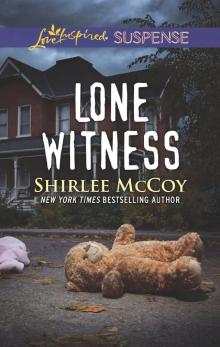 Lone Witness
Lone Witness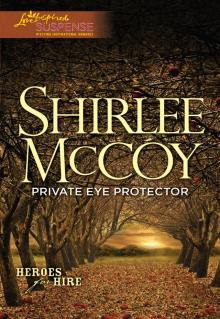 Private Eye Protector
Private Eye Protector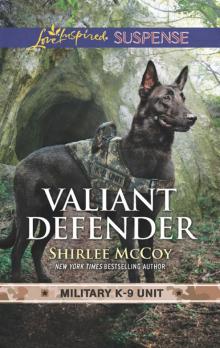 Valiant Defender
Valiant Defender Running Scared
Running Scared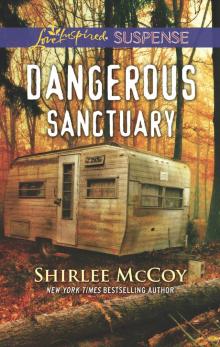 Dangerous Sanctuary
Dangerous Sanctuary Capitol K-9 Unit Christmas: Protecting VirginiaGuarding Abigail
Capitol K-9 Unit Christmas: Protecting VirginiaGuarding Abigail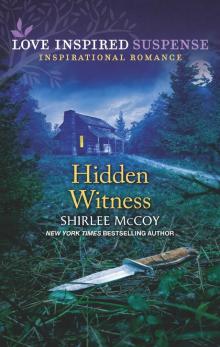 Hidden Witness
Hidden Witness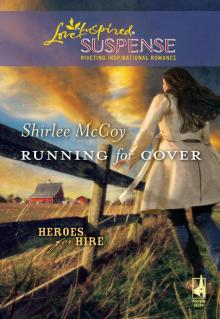 Running for Cover
Running for Cover Gone
Gone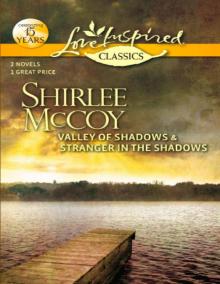 Valley of Shadows and Stranger in the Shadows: Valley of ShadowsStranger in the Shadows
Valley of Shadows and Stranger in the Shadows: Valley of ShadowsStranger in the Shadows Home with You
Home with You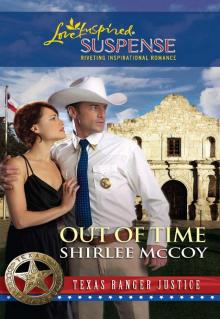 Out of Time
Out of Time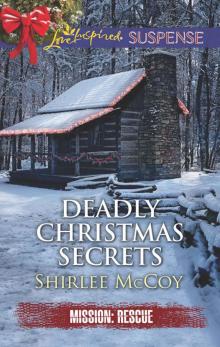 Deadly Christmas Secrets
Deadly Christmas Secrets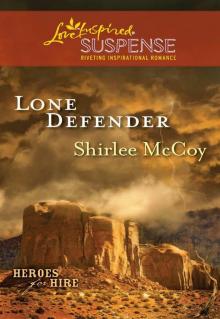 Lone Defender (Love Inspired Suspense)
Lone Defender (Love Inspired Suspense) Home Again
Home Again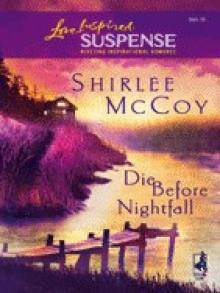 Die Before Nightfall
Die Before Nightfall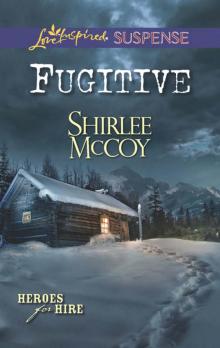 Fugitive
Fugitive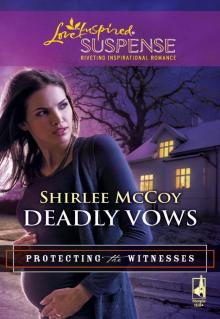 Deadly Vows
Deadly Vows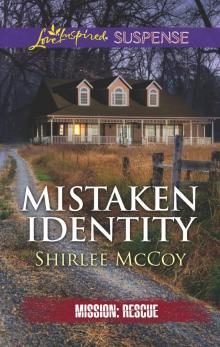 Mistaken Identity
Mistaken Identity Capitol K-9 Unit Christmas
Capitol K-9 Unit Christmas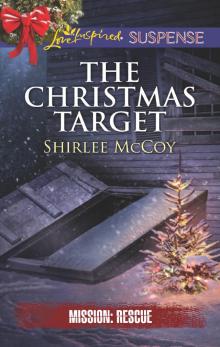 The Christmas Target
The Christmas Target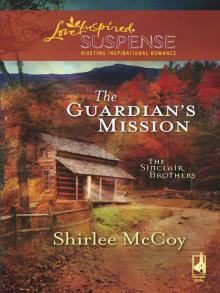 SB01 - The Guardian's Mission
SB01 - The Guardian's Mission Sweet Surprises
Sweet Surprises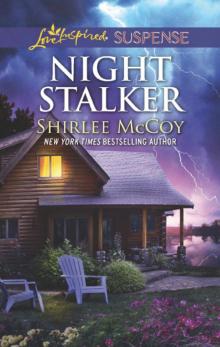 Night Stalker
Night Stalker The Cottage on the Corner
The Cottage on the Corner Love Inspired Suspense January 2014
Love Inspired Suspense January 2014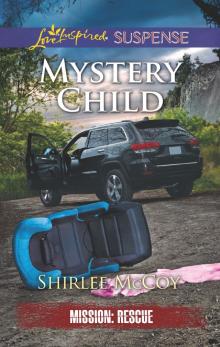 0373447477 (R)
0373447477 (R) Love Inspired Suspense March 2015 - Box Set 1 of 2: Protection DetailHidden AgendaBroken Silence
Love Inspired Suspense March 2015 - Box Set 1 of 2: Protection DetailHidden AgendaBroken Silence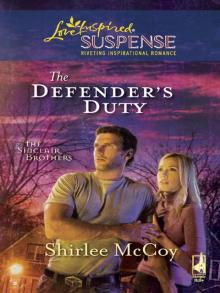 SB03 - The Defender's Duty
SB03 - The Defender's Duty Love Inspired Suspense June 2015 - Box Set 2 of 2: Exit StrategyPaybackCovert Justice
Love Inspired Suspense June 2015 - Box Set 2 of 2: Exit StrategyPaybackCovert Justice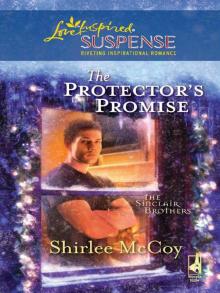 The Protector's Promise (The Sinclair Brothers)
The Protector's Promise (The Sinclair Brothers) Bodyguard
Bodyguard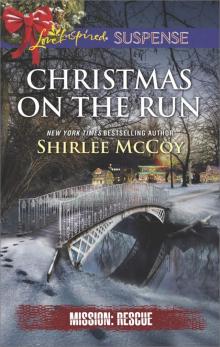 Christmas on the Run
Christmas on the Run The Orchard at the Edge of Town
The Orchard at the Edge of Town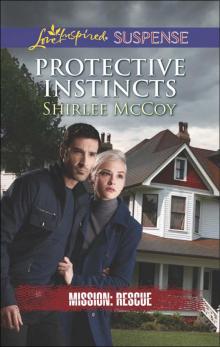 Protective Instincts
Protective Instincts Sweet Haven
Sweet Haven The House on Main Street
The House on Main Street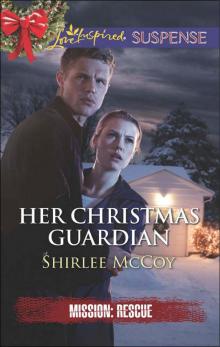 Her Christmas Guardian
Her Christmas Guardian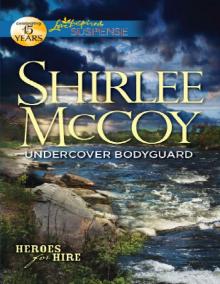 Undercover Bodyguard
Undercover Bodyguard